From the Editors: This is a summary of a far more comprehensive and in-depth analysis of the potential consequences of a Russian victory in Ukraine that was published by the Ukrainian Centre for Defence Strategies on 8 April 2024 and can be downloaded here.
It is actually more than ten years since President Vladimir Putin began his war against Ukraine and two years since it launched a full-scale invasion. What the final outcome will be remains unclear, though most analysts identify three possibilities:
- A frozen conflict or a peace agreement based on the present front line or something close to it.
- A Ukrainian victory in which Russia’s forces are expelled from all of Ukraine.
- A Russian victory in which all or a large portion of Ukraine is occupied.
I focused on the last scenario, because it is the outcome that will have the most significant negative consequences for both Euro-Atlantic and global security. A “stalemate”, “frozen conflict” or a compromise, where Ukraine cedes the occupied territories to Russia, is tantamount to a delayed Russian victory entailing many of the same consequences.
“Without Ukraine, Russia ceases to be an empire, but with Ukraine suborned and then subordinated, Russia automatically becomes an empire.” (Zbigniew Brzezinski
If Russia defeats Ukraine, it will have established the preconditions for great power status in Putin’s mind. Already the world’s biggest nuclear power, it will gain the economy, additional energy and commodities, technology, and human resources needed to achieve strategic parity with the US and China. These will serve as key enablers for a future westward push and effort to re-establish control over all areas formerly within the Soviet and Russian Empire sphere of influence.
The imperialistic concept of the “Russian World” proclaimed by Putin includes the “former territories of Kyivan Rus, the Kingdom of Muscovy, the Russian Empire, the Soviet Union, and the contemporary Russian Federation.” These areas include, what is currently, NATO territory.
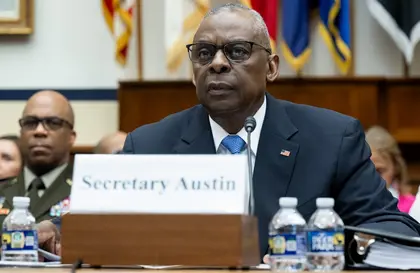
Pentagon Chief Pushes for Donation of More Patriot Systems to Kyiv
A Russian victory in Ukraine will have devastating consequences for Euro-Atlantic and global security. In the words of Josep Borrell, EU High Representative for Foreign Affairs and Security Policy: “If Ukraine loses, we lose.”
Geostrategic consequences
These will be enormous if Ukraine is defeated.
NATO’s border with Russia will increase from today’s 2,553 to 5,887 kilometers. Russian anti-access/area denial capabilities will move nearly 900 km closer to Warsaw, Berlin, Paris, Brussels and London, enabling the Kremlin to control most of the Black Sea and much of Northern, Eastern and Central Europe.
Several European cities with populations of over a million will be within 100-250 kilometers of the “new Russian border”. It will force the Alliance to maintain a huge standing army and a comprehensive air defense network at very high readiness along what will effectively become the frontline between democracy and autocracy.
The NATO 2022 Strategic Concept has already become a commitment to do less.
A Kremlin-installed puppet government will task remains of Ukraine’s defense and industrial sector according to Russian foreign policy and military doctrine. NATO will have lost a crucial military partner because it failed to accept Ukraine as a member, thereby allowing Russia to utilize Ukrainian resources and ingenuity. Europe will lose the strongest and most battle-hardened army on the continent and Russia will gain large parts of it, coercing and turning it for use against European states in a relatively short space of time.
A Russian victory will be perceived as a Western and NATO defeat, given that the Euro-Atlantic community and its partners, including Japan, South Korea, Australia and New Zealand, have publicly committed to supporting Ukraine. It will be ascribed to a Western lack of will and failure to realize its capabilities to stop Russia. The Euro-Atlantic community especially will suffer a significant reduction in its diplomatic, economic and military reach.
Even if it remains not directly involved, NATO might not be able to survive a Russian victory due to the fundamental discord that will ensue within the Alliance. It will be seen as having lost its ability to deter crises, conflicts and war.
Consequences for NATO’s strategic concept
Instead of committing to do more, or failing to address “Crisis Management” as envisaged in its 2010 Strategic Concept. The NATO 2022 Strategic Concept has already become a commitment to do less. It has been forced to reduce its level of ambition – despite Eastern Europe’s calls for the Alliance to intervene - for lack of political will and military capability.
Only 11 out of 31 NATO members presently meet the defense budget target of 2 percent of Gross Domestic Product (GDP). 15 members have never met the target since 2006. 25 members have a “backlog” of 10 or more years during which they did not fulfil the 2% pledge.
Therefore, despite the Alliances massive resources, it is experiencing a huge capability gap, and lack of sustainability, and is running out of weapons and ammunition which member states can supply to Ukraine and stockpile to resist future Russian aggression. The Euro-Atlantic defense industrial base is by no means scaled to meet the new 10-year security horizon.
A Russian victory in Ukraine will represent the completion of the first step in the Kremlin’s broader strategy.
A Russian victory will turn Ukraine into an area of guerrilla warfare and a zone of destabilization in Europe. It will trigger a much larger migration crisis than that after February 2022, beyond anything Europe has experienced since the Second World War.
It may be anticipated that more than 10 million Ukrainians will be on the move, potentially destabilizing Europe and the EU. It will also likely precipitate many Moldovans to flee to Romania and other EU countries, as a Ukrainian defeat would most likely be followed by a Russian attack on non-NATO Moldova.
Having gained access to Ukraine’s vast mineral wealth, gas, oil, agricultural land, technology and, especially, human resources Russia will have achieved the prerequisites for great power status. It will be in a drastically enhanced position to compel more concessions from Europe by weaponizing food, oil, gas, minerals and further migration, all backed up by its (eventually) positive experience of using military power and threatening use of nuclear arms.
Consequences for Russia
A Russian victory in Ukraine will represent the completion of the first step in the Kremlin’s broader strategy designed to confront its perceived enemy, the democratic collective West, especially the Euro-Atlantic community. Russia’s ongoing hybrid war will escalate.
Having succeeded in changing borders in Ukraine with impunity, the Kremlin has already been permitted to ignore international law and change the European security architecture that had enabled 70 years of security, stability and prosperity. The further collapse of NATO deterrence and the rules-based world order will cause more, not fewer, conflicts and wars globally.
Without firing a shot … even a mere offer of Ukrainian membership to NATO would fundamentally change the military balance.
The potential gains of victory for Russia significantly outweigh the costs the West is presently inflicting upon it. The US, the EU and the individual NATO members are still pursuing the very same strategy that allowed Russia to turn peace into crisis, conflict and full-scale war. They lack a unified vision of the desired end state, the required strategy for achieving it, and, not least, the willingness to do what is needed.
What can the West do?
To deny Russia a victory – and ensure European security and stability – the US, Europe and NATO urgently need to adopt a new strategy based on the enduring factors set out in this article. They must acknowledge that Ukraine is only one step in a broader Russian strategy. They must also recognize that Ukraine is crucial to both European security and the credibility of NATO.
Ukrainian NATO membership is possibly the only diplomatic initiative that could end the war. Without firing a shot and by means of a diplomatic declaration even a mere offer of Ukrainian membership to NATO would fundamentally change the military balance.
The decision would make the Alliance an official party to the war if hostilities continued beyond the date of Ukraine’s accession. It would mean that if Russia chose to continue attacking Ukraine after that date it would trigger NATO’s collective defense according to Article 5. It would therefore be a NATO “fait accompli” compelling Russia to accept Ukrainian NATO membership or accept the consequences of continuing the war.
It would also offer Putin an off-ramp. Putin cannot afford to look like he has been defeated by Ukraine – a nation he alleges “does not exist” – but he would accept a strategic withdrawal when faced with the world’s strongest military alliance.
The views expressed in this opinion article are the author’s and not necessarily those of Kyiv Post.
You can also highlight the text and press Ctrl + Enter


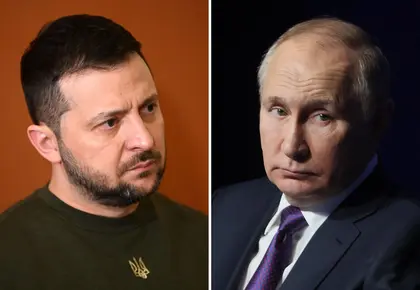
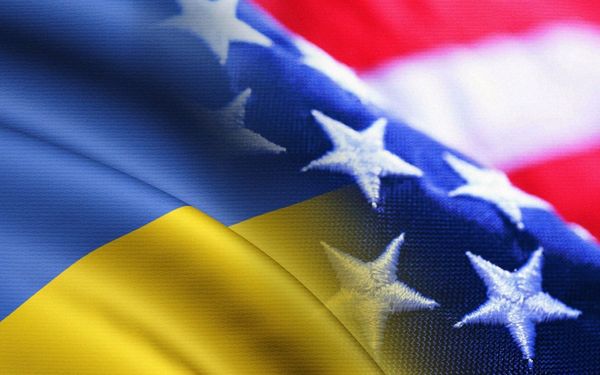
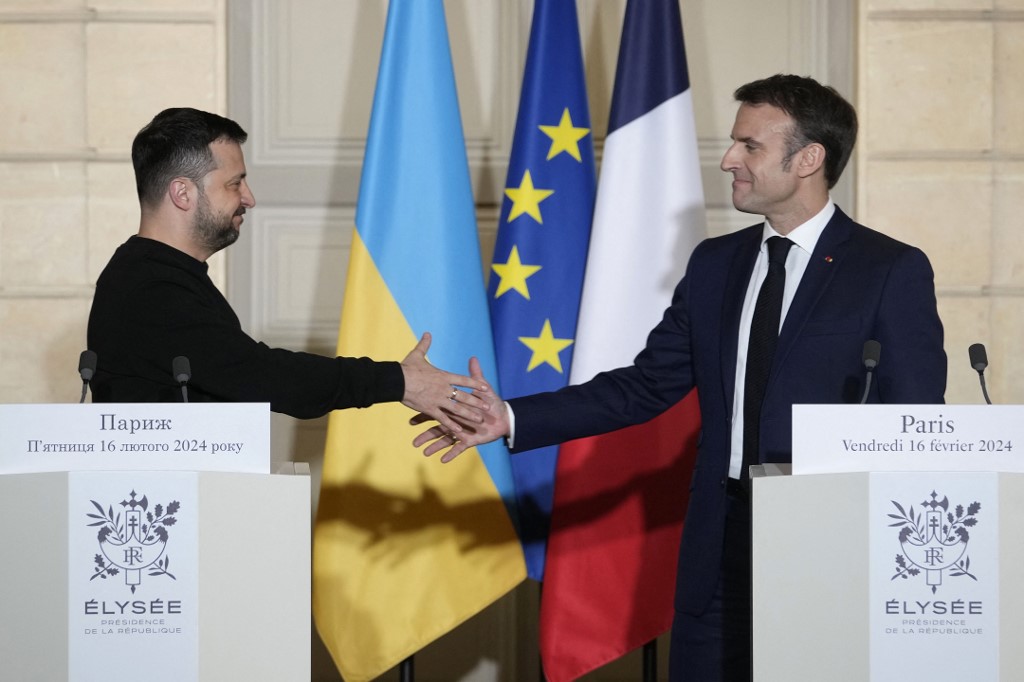
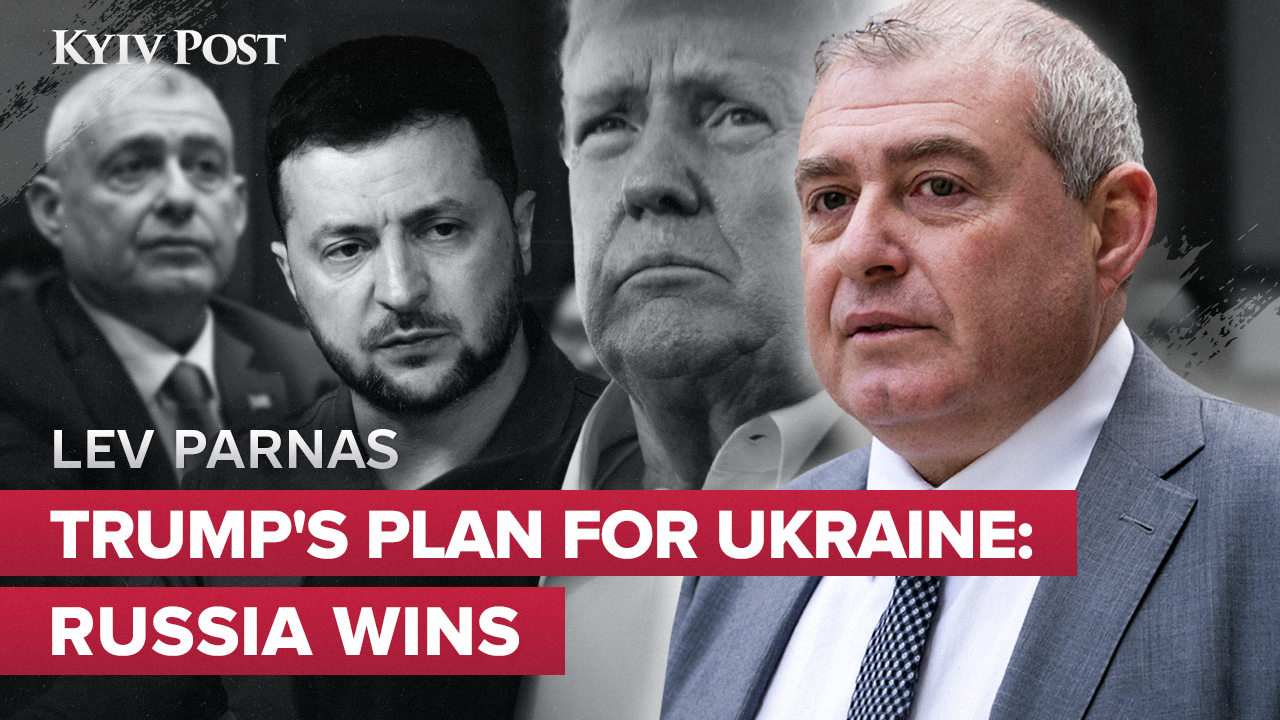
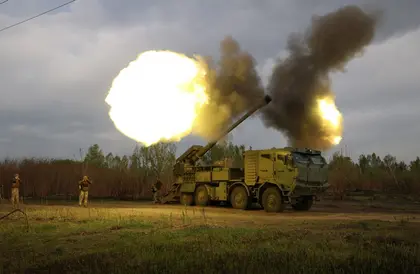
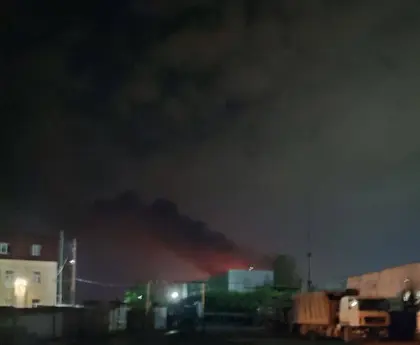
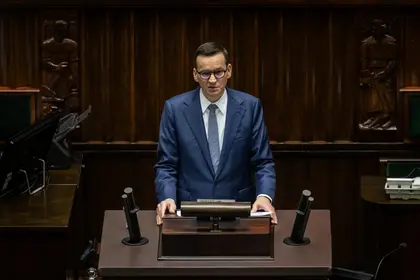
Comments (8)
@Please Stop Murdering To you Americans being broke: well, you will be even more broke if you do not help now. The cost of all the future conflicts that will ensue if russia is not subdued now will be astronomical, by an order or two higher than the cost of aid that is needed now to stop this. Do not let a criminal, charged with several crimes, standing trial for them, a person responsible for a coup attempt and for deaths of people during that coup attempt, a populist politician of the worst sort - do not let him win presidential elections. Put him in jail where he belongs. Stop whining and up your game.
@Please Stop Murdering Each Other with Drones, , you are completely wrong. I admit I thought along the same lines 20 yrs. ago. I am from Slovakia. We hated the russians passionately, they occupied our country and the rest of so-called Eastern Europe since we were left on the wrong side of the fence after WWII that the russinas started together with Hitler. And we didn't distinguish much between russians (that includes the other many ethnic groups that are a part of the so-called Russian Federation) and Ukrainians. Then, 20yrs. ago, I was building my family home, my house and by some turn of events I got a group of Ukrainian workers working with me there. I was very, very reluctant to take them at first, but my friend and schoolmate who had them before me urged me very intently to try. So I did. I was so surprised, believe me. Good men, hard workers, they did a good job, keen to learn new technologies, eager to do everything the way I wanted, honest, polite, they had initiative. They sent all the earned money back to their families so that their children could study. We are friends until this day. I have a lot of respect for them. Since then I understood the Ukraininas are no way like russians, they are Europeans, they are Slavic like the Slovaks, the Poles, the Czechs, the Slovenians, perhaps the Croatians. The russians are not Slavic - a competely different mindset.
Yes. Completely correct, of course. Thank you sir for writing it all up in such a concise manner.
@Please Stop Murdering Ukrainians,
Thank you new MRGA troll for quoting all the pre-ordained false 'facts' from Putins play book.
Here's a few Russian genocide against Ukrainian events which explain why Ukraine will not quit
* 1921-1922 Famine in Ukraine 1.5 million Ukrainians starve to death as food is confiscated and taken out of Ukraine to feed Russian cities.
* 1929-1930 De-kulakization: Over 500 000 farmers and families in Ukraine are sent to Siberia, executed, or sent to concentration camps.
* 1932-1933 Holodomor famine from caused by USSR's Joseph Stalin claimed the lives of 3.9 million Ukrainians or about 13 percent of its population at that time......
***May 2022 report by 30 internationally recognized legal scholars chronically acts that constitute genocide in the current war by the Putin regime.
143 nations say putin's invasion is illegal. Its temporary occupation of Crimes and the Donbas will not be internationally recognized....ever.
75 global allies now monetarily supporting Ukraine against russia's criminal regime. Russia's military is now being gutted.
The russian empire again balances on becoming a failed state. Putin's regimes crimes will not be forgotten. Russia's shame will be multi generational.
American here! We are broke, sorry! Can't afford to give you billions when we're 35 trillion in debt. Sorry! Have you considered a ceasefire? Ukrainians and Russians are genetically identical you know, there's no need to kill each other all day. Just saying! Honestly, I have a hard time telling your countries apart. Both are oligarchies. Both practice slavery (conscription). Both are repressive police states. There's no reason you can't get along, if Russians are Orcs, Ukrainians are goblins.
Українські військові, якщо ви хочете знати, як зруйнувати Кримський міст, надішліть мені повідомлення.
it is sad to say but Westerner nations seem to not care if Ukraine is successful in its goal to win this war... some nations are willing to see Ukraine surrender completely or at least give some lands to Russia!
the USA is failing to support Ukriane and may never give anymore support.
the USA is faced with an internal COUP where an unelected person now controls the government, a person who loves Putin. All actions must be approved by this COUP leader.
today the US is fast moving towards a Failed State situation.
As Americans sit back and watch Ukrainians die, cities completely leveled, lands lost that were hard fought for return last year. These areas and being taken over by Russia once again.
Many people give great speeches, "hearts and prayers" are no substitute for weapons and support.
Perhaps the US will wake up but do not hold your breath Ukraine... the US has failed you many times before.
It is crazy millions of Americans have embraced fascism and willing to install a fascist dictator.
@GregC, Biff you're supplying bombs that are killing a civilian population,why doesn't that bother you,is it because they're brown people
@Evil Yankee, true the USA has enabled Russia to bomb any civilian target in Ukriane, telling Ukraine they cannot use any US weapon to actually defend their lands... as long as Russia launches these bombs, missiles from within Russia... a Green Light has been given to Russia by AMericans.
@Evil Yankee, Was your sentence supposed to make sense? Please try to communicate better.
@GregC, Yankeez love fascists Knut , remember who supported, propped up Generals Pinochet Franco noreiga Marcos
@Evil Yankee, What's your point? What's this got to do with either Ukraine or the other 73 nations monetarily or miitarily supporting its defence against russia's criminal invasion?
Do you think your whataboutism condones russia committing its crimes in numerous other nations? 143 Nations in the UN do not think so.
How are the Russian's enjoying the pariah status their tyrant thug leader has earned for them?
@GregC, You're Right Begelensky is a little Mussolini wannabe
The article is talking about the conquest of the whole of ukraine as 'win' although it does not say so. But a ceasefire on the current line would not have the consequences described.